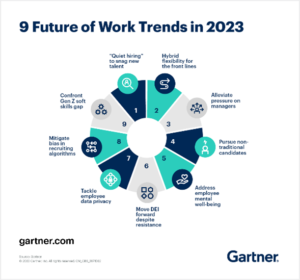Reference article: Talent Landscape Series: 9 Future of Work Trends For 2023

Referring to the Gartner research on the 9-Future work trends, 2023:
As we enter the third year since COVID-19 came into existence, the virus has proven to have a lasting impact on the future of work. In 2023, organizations face historic challenges: a competitive talent landscape, an exhausted workforce, and pressure to control costs. In this environment, it’s imperative to tackle the following nine trends as your organization sets strategic workforce and talent goals.
Trend 4: Pursuit of Non-traditional Candidates Expands Talent Pipelines. For years, organizations have talked about the strategic value of expanding and diversifying their talent pipelines. Now it’s time to “walk the talk.” Two key trends have emerged: To fill critical roles in 2023, organizations will need to be more comfortable assessing candidates solely on their ability to perform in the role, not their credentials and prior experience.
It’s more urgent than ever to rethink outdated assumptions about qualifications. In particular, the assumption that a college degree is an indicator of skill or work ethic will need to fall to the wayside. Organizations that embrace hiring based on ability and guide hiring managers to assess ability rather than credentials will be able to hire more talent more quickly than their competitors.
In the pursuit of expanding and diversifying talent pipelines, organizations have long recognized the strategic value of embracing non-traditional candidates. However, the shift from merely acknowledging the importance of diversity to actually implementing effective strategies remains a challenge. This debatable write-up delves into the key trends emerging in talent acquisition, focusing on the assessment of candidates based on their ability to perform in a role, rather than relying solely on their credentials and prior experience. While it is imperative to rethink outdated assumptions about qualifications, the argument that a college degree is not an indicator of skill or work ethic requires careful examination. Staying on the topic of the Gartner research, we explore the pros and cons of prioritizing ability over credentials and explores whether organizations that embrace this approach can truly gain a competitive edge by hiring talent more quickly than their counterparts.
Approach point 01: The Rise of Ability-Centric Hiring:
The concept of assessing candidates based on their ability to perform in a role is gaining traction as organizations seek to tap into a wider pool of talent. By shifting the focus from credentials to skills and potential, organizations can identify individuals who possess exceptional abilities but may not have followed traditional career paths. This approach encourages inclusivity, diversity, and the recognition of untapped potential.
Our argument 01: Overcoming Barriers to Entry
Critics argue that relying solely on credentials perpetuates inequality by limiting opportunities for those who lack formal education or have non-traditional backgrounds. Assessing ability enables organizations to consider individuals who possess unique talents and transferable skills, allowing for a more inclusive and diverse workforce.
Our Argument 2: Addressing Skills Gaps
The rapid pace of technological advancements and evolving industries often renders traditional qualifications insufficient. The ability-centric approach allows organizations to identify candidates with the specific skills required for critical roles, regardless of their educational background. This can help bridge the skills gap and promote a more agile workforce.
Approach point 02: Debunking the College Degree Paradigm (Approximately 250 words):
The assumption that a college degree is a reliable indicator of skill or work ethic has long been the norm. However, as the world of work changes, the relevance of this assumption must be critically examined.
Our Argument 1: Alternative Paths to Success
Many successful individuals have achieved remarkable feats without a college degree. By focusing solely on ability, organizations can uncover talent that may have been overlooked based on traditional credentials. This approach encourages individuals to pursue alternative paths to success and highlights the importance of practical skills and experience.
Our Argument 2: Credentials as a Measure of Commitment and Discipline
Opponents argue that a college degree demonstrates commitment, discipline, and the ability to complete long-term goals. By overlooking this aspect, organizations may inadvertently devalue the qualities associated with obtaining a degree, potentially leading to a workforce lacking in perseverance and dedication.
Approach point 03: Expedited Talent Acquisition and Competitive Advantage (Approximately 250 words):
Organizations seeking a competitive edge in a dynamic job market must carefully consider the benefits and potential challenges of prioritizing ability over credentials.
Our Argument 1: Faster Hiring Processes
By emphasizing a candidate’s ability to perform, organizations can streamline their hiring processes, reducing the time it takes to identify and onboard talented individuals. This agility can give organizations a distinct advantage in acquiring the best talent ahead of their competitors.
Our Argument 2: Identifying Hidden Potential
An ability-centric approach opens doors to candidates who possess innate talent but may not have had the opportunity to acquire formal qualifications. By focusing on skills, organizations can uncover hidden potential and harness it for organizational growth and innovation.
While the pursuit of non-traditional candidates and the evaluation of ability over credentials offer potential benefits, the shift in hiring practices is not without its challenges. Striking the right balance between recognizing the importance of qualifications and valuing skills and potential requires careful consideration. Organizations that successfully navigate this terrain can gain a competitive edge by fostering diversity, tapping into untapped talent, and expediting their talent acquisition processes. However, caution must be exercised to avoid dismissing the value of credentials entirely, as they can still provide valuable insights into an individual’s commitment and dedication. As organizations continue to evolve, rethinking traditional hiring practices and embracing the assessment of ability alongside credentials will be crucial for building resilient and successful teams in the ever-changing world of work.





